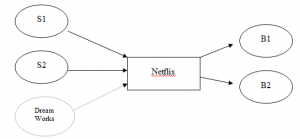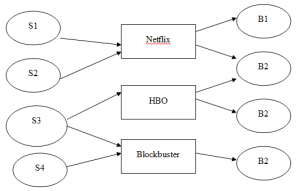Netflix
With the Internet explosion that began this century, while many companies failed in the .com bust, other thrived, using the ease and accessibility of the Web to attract more customers than previously possible. One of these is Netflix. While I have personally never used Netflix, I know many who have, and based off this article http://www.nytimes.com/2011/09/26/business/media/netflix-secures-streaming-deal-with-dreamworks.html have a little more insight as to how it actually works as a business.
While many people think of material providers (Wal-Mart, Radio Shack, etc.) as simply places to find certain things to buy, they often don’t think of how they get their products or who they get it from. It’s the prices people think of. With Netflix, people think of flat rate rentals with unlimited rental periods at a cheap price – basically a library of things to watch. Yet Netflix is more accurately portrayed as a trader, with the sellers as film studios and buyers as customers. Completing the new deal with DreamWorks would add another seller to the list:

This would potentially draw more buyers to Netflix, and away from its competitors. Indeed, the article states the deal DreamWorks has with Netflix is replacing an accord with HBO; an illustration of one trader offering a higher bid price to a seller to sway him away from another trader. A broader view of the network would look like:

It certainly seems like rough competition in the video streaming world, as the article states that HBO has itself been paying “steep licensing fees” for exclusive film rights, but nevertheless losing DreamWorks to Netflix. I can only imagine how much back-end processing Netflix must go through to determine its pricing and rental system to remain on top of the video rental/streaming world and keep its consumer base growing. In fact, recently it made an infamously bad decision highlighted here http://mediadecoder.blogs.nytimes.com/2011/10/10/netflix-abandons-plan-to-rent-dvds-on-qwikster when it lost nearly 800,000 customers by raising prices for its Internet-and-Rental service, from which it quickly backtracked.

As an Information Science major myself, I am greatly interested in how these companies analyze information and predict the trends and behavior of their customers to maximize marketing technique. Perhaps in the future I may find myself working for them; in the mean time, enjoy your Kung Fu Panda and Tropic Thunder!
While many people think of material providers (Wal-Mart, Radio Shack, etc.) as simply places to find certain things to buy, they often don’t think of how they get their products or who they get it from. It’s the prices people think of. With Netflix, people think of flat rate rentals with unlimited rental periods at a cheap price – basically a library of things to watch. Yet Netflix is more accurately portrayed as a trader, with the sellers as film studios and buyers as customers. Completing the new deal with DreamWorks would add another seller to the list:

This would potentially draw more buyers to Netflix, and away from its competitors. Indeed, the article states the deal DreamWorks has with Netflix is replacing an accord with HBO; an illustration of one trader offering a higher bid price to a seller to sway him away from another trader. A broader view of the network would look like:

It certainly seems like rough competition in the video streaming world, as the article states that HBO has itself been paying “steep licensing fees” for exclusive film rights, but nevertheless losing DreamWorks to Netflix. I can only imagine how much back-end processing Netflix must go through to determine its pricing and rental system to remain on top of the video rental/streaming world and keep its consumer base growing. In fact, recently it made an infamously bad decision highlighted here http://mediadecoder.blogs.nytimes.com/2011/10/10/netflix-abandons-plan-to-rent-dvds-on-qwikster when it lost nearly 800,000 customers by raising prices for its Internet-and-Rental service, from which it quickly backtracked.

As an Information Science major myself, I am greatly interested in how these companies analyze information and predict the trends and behavior of their customers to maximize marketing technique. Perhaps in the future I may find myself working for them; in the mean time, enjoy your Kung Fu Panda and Tropic Thunder!
